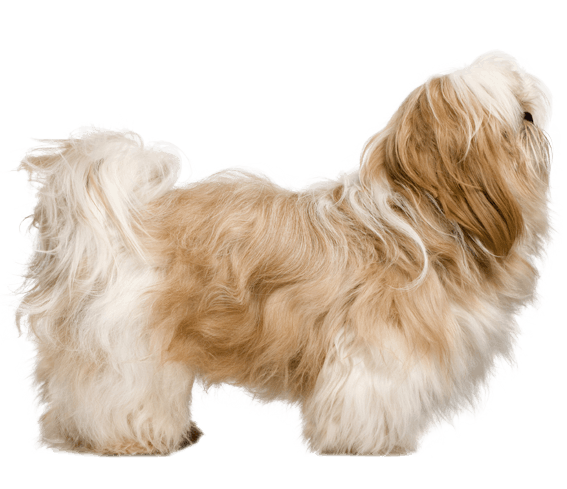Shih Tzu Breed Maintenance
Is a Shih Tzu hypoallergenic? Surprisingly, yes. For a breed with such a luxurious, thick coat, it sheds relatively little though no dog is completely 100% hypoallergenic.
The Shih Tzu coat is pretty to look at, but also undeniably hard work to deal with — and it won’t be long before you’re an expert in Shih Tzu grooming.
If you’re committed to keeping it at a naturally long length — say if you’re planning to enter your dog into shows — you’ll need to brush and comb their coat every day to prevent it getting knotted. Weekly bathing is also recommended, too.
How much do Shih Tzu shed? Typically, the breed sheds less than other varieties of dog, but there’s an intense period of fur loss at the two-year-stage when the juvenile coat is replaced by the mature one.
You wouldn’t be alone in thinking that keeping a Shih Tzu’s fur at a long length sounds like a lot of unnecessary effort. That’s why it’s also a popular choice to take regular trips to the groomer — or even master the skills yourself — to keep their coat tightly cropped. This still needs brushing and combing every two or three days.
Aside from their fur, Shih Tzu’s are fairly low-maintenance animals. Parents should regularly brush their teeth and inspect their ears for signs of infection, as well as keeping nails clipped.
They don’t ask for much by way of exercise — half an hour’s activity a day should suffice or just six miles a week walking. As you can imagine, Shih Tzu aren’t fond of high temperatures, so it’s best to keep them indoors when the thermometer hits the upper reaches.
Shih Tzu Health Risks
This is generally a healthy breed and the Shih Tzu lifespan can often be impressively long — the oldest recorded among the breed reached a whopping 23 years of age.
However, this isn’t to say they’re completely immune from adverse health conditions. Some of these are hereditary and it’s imperative that parents only deal with Shih Tzu dog breeders who carry out health screening on their animals — never be afraid to ask for proof of this.
Eye Problems
One of the Shih Tzu’s most adorable features are their big, round eyes, but unfortunately, they can sometimes fall victim to disorders such as cataracts, progressive retinal atrophy or retinal detachment. If the eyelids are unable to close properly, your dog might suffer from inflammation or dry corneas.
Some of these are treatable to some degree, especially if caught earlier. Regular eye testing at the vet’s is essential, but you can also ask for their professional opinion if you notice your Shih Tzu’s sight deteriorating in any way — perhaps a newfound clumsiness or cloudy-looking lens.
Intervertebral Disc Disease
Like many dogs with a long back and short back legs — Dachshunds, Basset Hounds and Beagles among them — Shih Tzu are more likely to suffer from Intervertebral Disc Disease (IVDD).
Often known as a slipped disc, this neurological disease happens when one of the squishy discs in the spine becomes misaligned and impedes onto the spinal cord, which is made up of nervous tissue; you can only imagine how painful this is.
Depending on which part of the spine is affected, you might notice your dog in distress, limping, hunched over or finding it difficult to urinate or defecate. Alternatively, they might seem weak, lethargic or less hungry than usual.
Once your vet has settled on a diagnosis of IVDD, there are lots of options available, ranging from medication and temporary confinement for limiting movement to emergency surgery in cases of paralysis. Recovery is possible, although it can sometimes be a slow process.
Brachycephalic Syndrome
Shih Tzu are among a number of breeds with squashed-up faces that look very cute, but can ultimately be detrimental to their health.
Brachycephalic Syndrome occurs when there are deformities in the upper airway and it can often be very obvious when this is the case. Ever seen a tiny dog panting excessively or gagging when exercising? This could be the reason.
What should you do when this condition arises? Well, your vet will always recommend your Shih Tzu is kept within a healthy weight range, so the worst of the symptoms aren’t exacerbated. Other lifestyle changes can help, such as avoiding hot weather or the minimization of stress.However, surgery can sometimes help, especially if a cleft palate is worsening the issue. Otherwise, nostril tissue or laryngeal saccules can be removed.
All dogs can benefit from regular examinations and check-ups, and the Shih Tzu is no exception. A wellness plan keeps you in regular contact with the vet, who will be able to spot potential medical problems long before they become a major problem.
Feeding a Shih Tzu — What’s the Best Food?
Being small in stature and none too fond of lots of exercise, the Shih Tzu doesn’t require much by way of food. At the same time, this relatively sedentary lifestyle means they can become overweight quite easily, which can open the door to some health problems. Ask your vet for advice on the amount of food to give your pet.
In addition, pet parents need to ensure that kibble is correctly sized for Shih Tzu-sized jaws, as regular-sized dry food can pose a choking hazard.
Our partner Dog Food Advisor is the go-to authority when it comes to your pet’s dinner — here, they’ve put together a list of the best dog foods for Shih Tzu.






